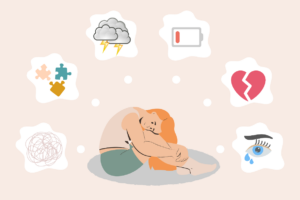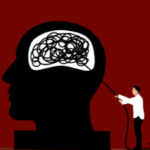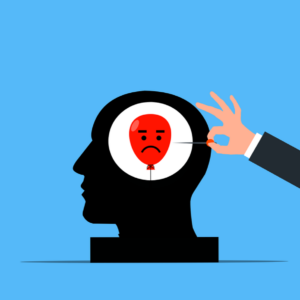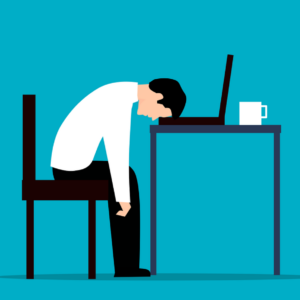Areas of expertise
Psychology uses scientific methods to study mental processes and behaviors.
Laura TAHLI is a psychologist whose goal is to help individuals better understand their mental functioning and resolve the challenges they encounter in both professional and personal spheres.
Anxiety disorders
Anxiety disorders are characterized by intense feelings of worry, anxiety, or fear that can interfere with a person’s daily life. It represents an exaggerated response of the nervous system to certain situations.

There are different types of anxiety disorders, including generalized anxiety disorder, panic disorder, phobias, obsessive-compulsive disorder (OCD), and post-traumatic stress disorder (PTSD).
Each type has its own characteristics, but all involve a level of anxiety that is disproportionate to the actual situation.
Depressive disorders
Depression is a mood disorder that affects your way of thinking, feeling, and functioning in daily life. Unlike normal mood fluctuations, the symptoms of depression are more intense and typically last for an extended period, often lasting for several weeks, months, or even years.

Depression is characterized by persistent sadness and a loss of interest or pleasure in normally enjoyable activities, leading to an inability to carry out daily activities for at least two weeks.
Post-traumatic stress disorder (PTSD)
Imagine that your brain is a bit like an alarm system. Normally, this alarm system triggers in times of danger to help you react quickly. This is what happens when you pull your hand away from a hot plate or slam on the brakes to avoid a car collision. Once the danger has passed, your alarm system “resets” and returns to a state of calm.

Post-traumatic stress disorder (PTSD) can develop when you experience a highly stressful or traumatic event. It’s as if this event caused a short-circuit in your alarm system. Instead of resetting after the danger, your alarm system may remain active. This means you can feel constantly in a state of stress or danger, even when you are safe.
Affective dependence
Emotional dependence is characterized by a constant need for validation, approval, or support from another person. In other words, it’s when you feel that you cannot be happy, satisfied, or even functional without the approval, presence, or affection of someone else. This can range from dependence on a partner, a friend, a parent, or any other person who holds significant importance in your life.

Everyone needs love and affection; it’s a normal part of the human condition. However, when this need becomes so overwhelming that it starts to negatively impact your life, such as preventing you from pursuing your own dreams or aspirations, or causing constant anxiety about the possibility of the other person leaving you, then it could be a sign of emotional dependence.
Self-esteem
Self-esteem is the way you view yourself. It’s a mixture of your self-opinion, your value as an individual, and the confidence you have in your own abilities and judgment. It’s not a static concept; it can fluctuate depending on different situations, experiences, and emotional states.
Self-esteem is like the foundation upon which a house is built. If this foundation is solid, it will reliably support the structure through all kinds of weather (life challenges). If it is fragile, the house may crumble under pressure.

Self-esteem is a psychological concept that refers to a person’s self-judgment. It is an overall evaluation of one’s worth, abilities, and qualities. Someone with high self-esteem feels capable, competent, and worthy of love. Conversely, a person with low self-esteem feels inferior, incompetent, and unworthy of love.
burnout
Burnout is a state of emotional, physical, and mental exhaustion caused by excessive and prolonged stress. It occurs when you feel overwhelmed, emotionally drained, and unable to meet constant demands. Burnout can lead to a loss of interest and motivation in your work or responsibilities, resulting in decreased productivity and feelings of cynicism or detachment.
Burnout doesn’t happen suddenly; you don’t wake up one morning and suddenly feel “burned out.” Its nature is much more insidious, creeping up on us over time like a slow leak, making it much harder to recognize.

Burnout is a gradual process that sets in slowly, often without us realizing it. But your body and mind can give you warning signs. If you constantly feel tired, struggle to get out of bed in the morning to go to work, feel detached from your job, or experience frustration and dissatisfaction, you may be experiencing burnout.
Impostor syndrome
Impostor syndrome” (also known as “imposter syndrome” or “imposter phenomenon”) is a psychological phenomenon in which a person struggles to internalize their accomplishments and has a persistent fear of being exposed as a “fraud.

Despite external evidence of their competence, these individuals believe that they do not deserve the success they have achieved.
